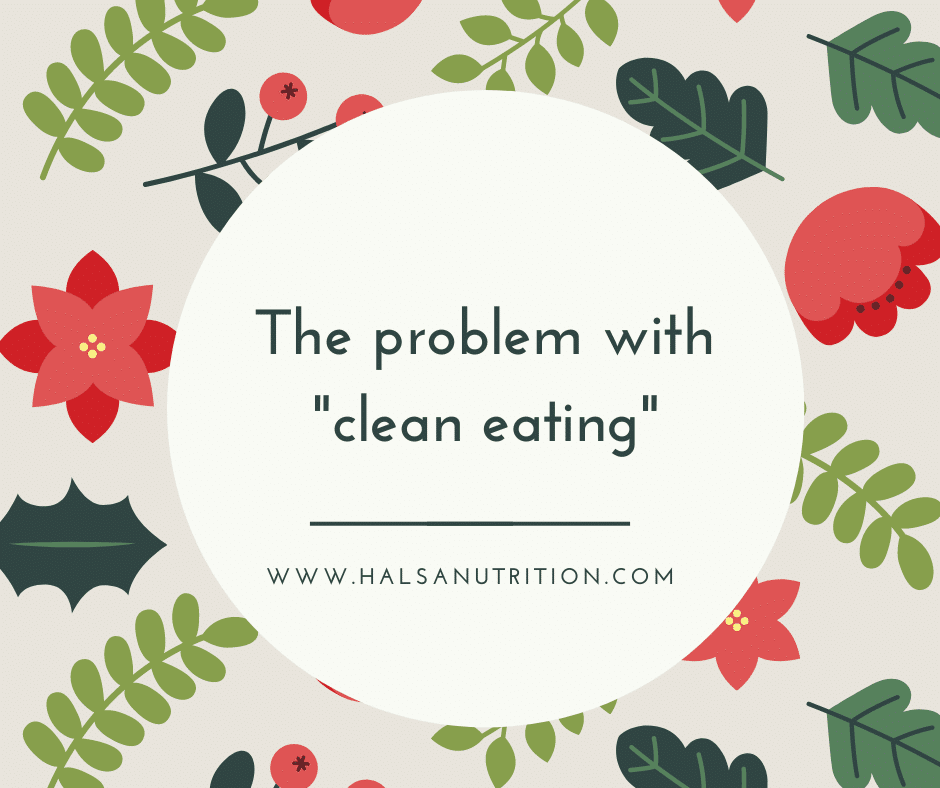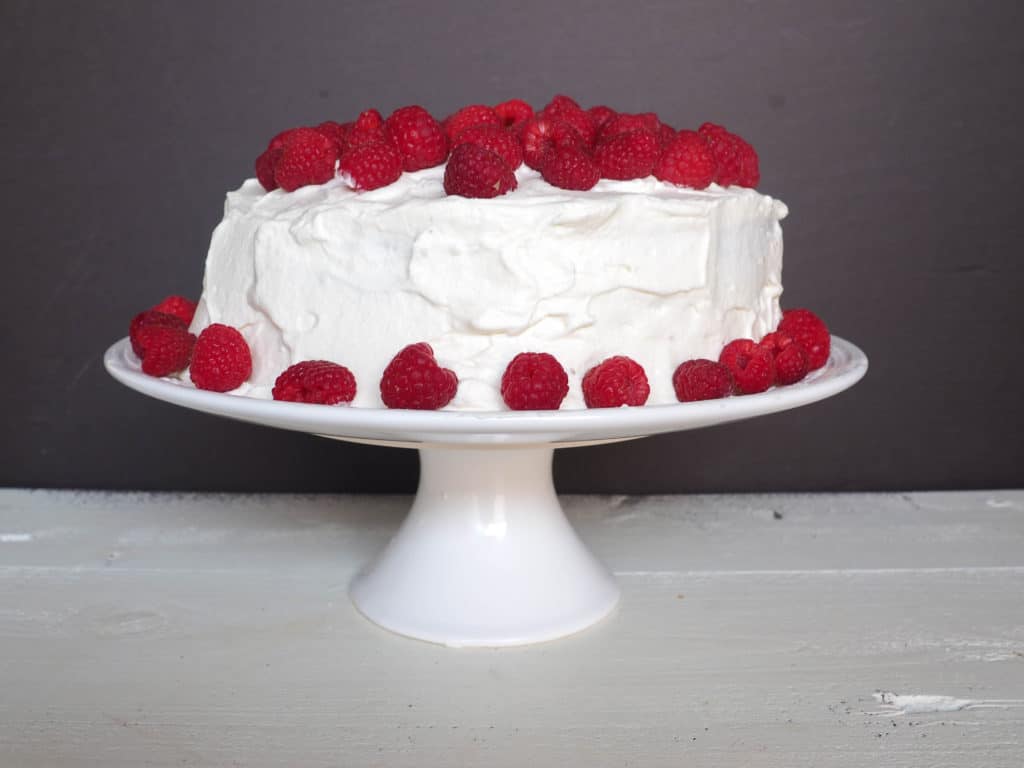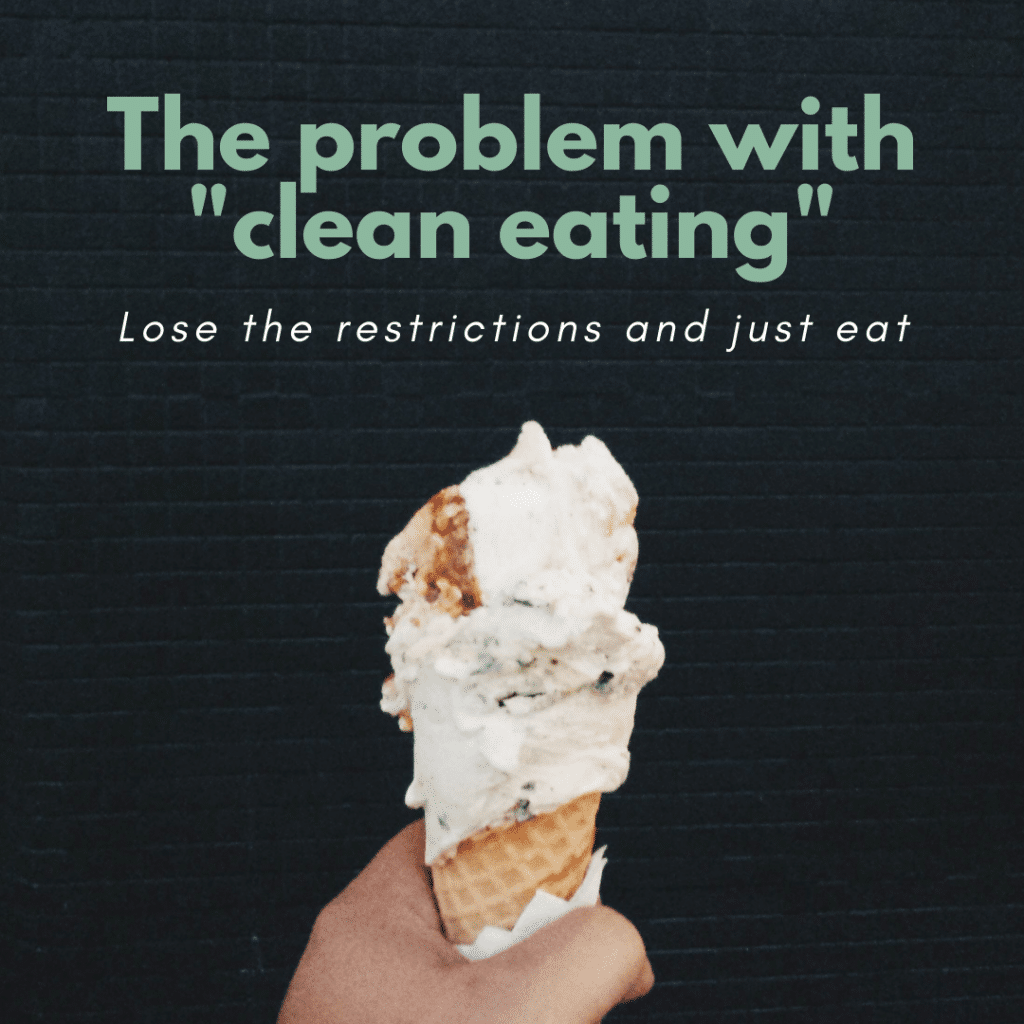
The Problem with “Clean Eating”
Have you tried “clean eating”? Or perhaps going gluten-free, processed-free, sugar-free, and organic in the name of health? It’s time to “dirty up” your diet. Lose the restrictions and bring back joy and freedom.
Estimated reading time: 7 minutes

I’m all for “healthy” eating. Research shows that what we eat can play a role in preventing disease and helping us feel great.
That said, health is not just about healthy eating. And what is healthy eating anyway? Does it mean eating dairy-free? Avoiding all processed foods? Should you eat Keto? Paleo? Gluten-free? Vegan? Is it “clean eating”?
What is healthy eating?
The fact is that healthy eating can take on many forms. It’s a way of eating that helps you thrive now and in the long term. This includes not just what you eat but also your relationship with food.
For some, it may indeed be a vegan diet, and for others, it may need to be gluten-free or dairy-free due to a medically diagnosed intolerance or allergy.
In general, all foods can fit into a healthy diet. If there are restrictions, the key is being clear on why you have chosen these restrictions. If you think you have a food sensitivity or intolerance, work with a doctor and dietitian to help you create the least restrictive eating plan to help you thrive.
Nourishing your body, mind, and soul
I like to use the term nourishing instead of healthy.
Nourishing eating also means finding joy in eating. It means nourishing your body and mind with foods that make you thrive, not foods you hope will make you thin or “clean.” It means eating intuitively, without guilt or judgment. It means enjoying your family’s cultural foods. Perhaps most importantly, it means having a healthy relationship with food.
Nourishing eating focuses on not just the body, but also the mind and soul.
Healthy eating is not clean eating
The term “clean eating” focuses on eating pure, unprocessed, and natural foods. It also often entails eating gluten-free and dairy-free for health (not just allergies). It’s problematic for many reasons. For one, it implies that foods that don’t meet these criteria are “bad” or “dirty” and should be avoided.
It should also be noted that many nutrient-rich foods are processed–from oats to beans to yogurt. It’s too simplistic to label and divide foods into these categories.
Clean eating is also a phenomenon that tends to be associated with wealth, thin privilege, and wellness culture in general. Think avocado, kale, quinoa, wild salmon, and green smoothies. Sure, those are all great foods, but when they are put on a pedestal as being superior to other foods, it’s a problem.
There is no actual definition of “clean eating.” It’s here, thanks to diet culture. I know many dietitians like to joke that the only foods that are “dirty” are those that fell on the floor and weren’t washed!
The reality is that there is room in a diet for ALL foods. There is no need to stress when eating out and realizing the only option is fried food. Likewise, if your child has some artificially flavored and colored foods now and then, it’s ok.

Orthorexia: When healthy eating goes too far
When “healthy” or “clean” eating becomes an obsession, it’s unhealthy. The term “orthorexia” was first coined in 1997 by Steven Bratman, MD. Orthorexia means having an unhealthy obsession with the quality of food eaten (in comparison to anorexia, which focuses on the quantity of food eaten). This focus on healthy or “righteous” eating increases the risk of developing another eating disorder, such as anorexia.
The clean eating phenomenon of recent years has likely contributed to the rise in cases of orthorexia and disordered eating. The problem with clean eating is that it implies that some foods are dirty or bad. This, in turn, leads to unnecessary restrictions, rules, guilt, and obsessions.
Food has no moral value. Sure, some foods have a higher nutritional value than others and some foods are less processed than others, but this doesn’t mean they should be broken into categories that label them “clean” vs. “dirty” or “good” vs. “bad”.
What about if you need to lose weight?
More and more evidence is showing that weight does not determine health.
So, take weight out of the equation. Instead, focus on habits that nourish your body and mind, and the rest will fall into place. Ditch the diets. Weight loss diets are restrictive and generally don’t work in the long run. Over 90% of people who go on weight loss diets end up gaining the weight back, and often more, within 5 years.
If you are ready to make peace with your body and food, seek the help of a Registered Dietitian who specializes in intuitive eating. Yes, it’s possible to eat without restrictions or counting calories and still enjoy good health!
Lose the restrictions and just eat
So I’m here to tell you to lose the restrictions and just eat. Of course, if you have a food allergy or a diagnosed medical condition that requires you to eat a certain way, that is an exception. But for most of us, “healthy” eating can be as simple as choosing nutrient-rich foods most of the time.
Trust your intuition and eat what you want, how much you want, and when you want. Eat fresh baguette. Add a slice of cheese if it makes you happy.

Happy? Yes, happy! It’s part of the health equation. Eating should provide pleasure. Food is meant to nourish both the body and soul. So eat it with joy. Share it with friends and family. Savor. Eat mindfully when you can.
Of course, realize that you won’t always feel joy or pleasure when eating. Sometimes, you may eat mindlessly while scrolling on your phone. Other times, you may eat so quickly that you overeat. And other times, you may binge on ice cream because you are sad. It’s all ok. That is life. As we learn in meditation, don’t judge; recognize it and move on. Chances are there will be another mealtime again soon, a new chance to be mindful and kind to yourself. Eventually, you will find rhythm and balance in most of your eating habits.
Additional suggestions:
If you are someone who is easily influenced by Instagram accounts touting “clean” eating or restrictive diets, go ahead and unfollow them. Instead, surround yourself with nourishing photos and messages that inspire you and are realistic. Remember, there is no one right way to eat, and often, restrictions do more harm than good.
Be wary of nutrition advice from anyone who is not a Registered Dietitian. Realize that anyone can call themselves a nutritionist or get a nutrition degree online. Instead, seek out Registered Dietitian Nutritionists with a non-diet approach to food and health.
Additional Posts You Might Like
- What is Nutritionism?
- Diet Culture and How to Spot it
- Letting Go of the Diet Mentality
- How Intuitive Eating Affects Health Markers
- Whole Foods vs Processed Foods: What You Need to Know
- Disordered Eating: More Common than You Realize
Also, check out these great books:
Disclosure: The links below are Amazon affiliate links. As an Amazon Associate, I earn from qualifying purchases. Please note that I only recommend products that I fully endorse and love.
- Intuitive Eating by Evelyn Tribole and Elyse Resch
- Anti-Diet by Christy Harrison
- Fearing the Black Body: The Racial Origins of Fat Phobia by Sabrina Strings
- Unapologetic Eating by Alissa Rumsey
- Gentle Nutrition: A Non-Diet Approach to Healthy Eating by Rachael Hartley
- Health at Every Size by Linda Bacon
This post was originally published in 2018 and updated in 2025.
Leave a Reply